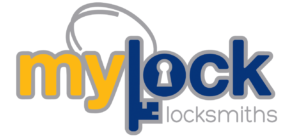If you’re looking into electronic or smart locks in your home, you might be trying to work out if it’s the best option for keeping your home and belongings safe. Electronic entry is particularly popular in blocks of flats, as multiple occupants would need 2 sets of keys just to get into their homes. The issue of keyless entry or electronic entry is still a little bit contentious, but both have their pros and cons, including how easy they are to break through. Today, we’re going to explain all of that, and more.
Types Of Digital Lock
When it comes to digital and electronic locks, they are not all created equal. In fact, there are 7 different types of electronic lock, each more suitable for a different location or purpose They are:
- Magnetic Locks – An electromagnet and an armature plate that keeps the door firmly locked using magnetic force, which is only stopped when the door is properly unlocked. These locks can be easily dismantled, and have one of the lower security ratings.
- Electric Door Strikes – Electric replacements for a traditional strike faceplate commonly used on latch bar doors. The latch works with an electric current, which either locks or releases the latch.
- Electric Bolt Locks – Ideal for internal doors and secure cabinets. These locks are similar to deadbolts, but considerably stronger, and compatible with most electric systems.
- Electronic Keypad Locks – The most commonly used electronic lock, requiring you to type in a passcode to unlock the door. No passcode, no getting through the door.
- RFID Locks – These use a Radio Frequency Identification (or RFID) chip (usually in a card or a fob) that sends a signal to unlock a door when you are near it. These are generally integrated with other locking systems in a high-security location.
- Bluetooth Locks – A lock that uses Bluetooth to control access to any door or room. If you want to open the door, you need a smartphone or Bluetooth-enabled device to be within proximity of the sensors. This one is most often seen in ‘self-unlocking cars’.
- Biometric Locks – Using fingerprints or retinal scans to determine if a person is allowed inside, and only opening if they are authorised then the door will open. This is seen as the peak of lock technology, and most often seen in offices rather than homes.
Some of these locks are much more difficult to break into than others, which means your common garden-variety criminal won’t even try. It makes them a very effective deterrent and security measure for homeowners and businesses alike!
Keypad Locks
Code locks can be a great option if you often lose your keys (or have kids who forget theirs), or if you need to give other people access to your home. However, there are some security risks involved in a code entry system. For example, a code (especially the common 4-digit variety) is easy to learn. This is great for you when you’re trying to remember the code, but it means a burglar who is watching your home could easily see you enter the code and remember it too. There are a few other methods of working out a door code for the determined thief. They can check the keypad for wear and tear on certain numbers that have obviously been pressed more often than others. They can also use talcum powder to show up the oily residue from your skin left on the keys. This is why you should make a point of changing your code regularly, and cleaning your keypad often to stop those oils from creating permanent marks on the keys.
Smart Locks
Smart locks are incredibly convenient, allowing you to see who’s at the door even if you aren’t there, remotely lock your door from anywhere, and enter your home with just a fob. Like with code locks you can grant access at any time, and revoke it whenever you want to as well, which makes it perfect for letting people in and out of your home, whether they’re a carer, a cleaner or a babysitter.
But how safe are they? Technically a smart lock can be hacked using Bluetooth, Wi-Fi or an outdated companion app, but the likelihood is incredibly small. That’s because most burglars simply don’t have the knowledge on how to do the kind of sophisticated break-in that smart locks require. This makes a smart lock one of the safest choices you can make for your home security – even more so if you choose a lock from a reputable manufacturer with two-factor authentication and 128-bit encryption. If a burglar sees that you have a smart lock, they are more likely to just pop your front door open with a crowbar – at which point the lock will notify you that your door has been opened unexpectedly and you can take swift action.
Overall, keyless entry is a great alternative to keys for garages, sheds, internal doors and the outer entrances of blocks of flats. Beyond that, they need to be used alongside other security measures or manual entry systems in order to keep your home secure. Smart locks are a better option for front door keyless entry, but only if installed by a qualified professional.
At My Locks, we’re always happy to discuss security, including the pros and cons of electronic locks, and help you find the right solution for you. To find out more, just get in touch with the team today so that we can have a chat.
